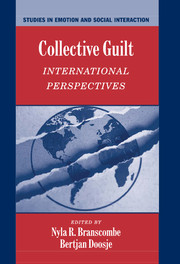Book contents
- Frontmatter
- Contents
- Preface
- List of Contributors
- Collective Guilt
- Section 1 Defining the nature of collective guilt
- Section 2 The Relationship Between Group Identification and Collective Guilt
- Section 3 Consequences for Intergroup Relations
- 11 Intergroup Forgiveness and Guilt in Northern Ireland: Social Psychological Dimensions of “The Troubles”
- 12 Intergroup Reconciliation Processes in Israel: Theoretical Analysis and Empirical Findings
- 13 On Whether to Apologize to Indigenous Australians: The Denial of White Guilt
- 14 Racial Wrongs and Restitutions: The Role of Guilt and Other Group-Based Emotions
- 15 Importance of Social Categorization for Forgiveness and Collective Guilt Assignment for the Holocaust
- Section 4 Commentary on the Volume
- Index
- References
12 - Intergroup Reconciliation Processes in Israel: Theoretical Analysis and Empirical Findings
Published online by Cambridge University Press: 05 January 2012
- Frontmatter
- Contents
- Preface
- List of Contributors
- Collective Guilt
- Section 1 Defining the nature of collective guilt
- Section 2 The Relationship Between Group Identification and Collective Guilt
- Section 3 Consequences for Intergroup Relations
- 11 Intergroup Forgiveness and Guilt in Northern Ireland: Social Psychological Dimensions of “The Troubles”
- 12 Intergroup Reconciliation Processes in Israel: Theoretical Analysis and Empirical Findings
- 13 On Whether to Apologize to Indigenous Australians: The Denial of White Guilt
- 14 Racial Wrongs and Restitutions: The Role of Guilt and Other Group-Based Emotions
- 15 Importance of Social Categorization for Forgiveness and Collective Guilt Assignment for the Holocaust
- Section 4 Commentary on the Volume
- Index
- References
Summary
The Israeli-Palestinian conflict involves two national movements that lay claim to the same land. Since the end of the first major Arab-Israeli war in 1948, relations between Israelis and Palestinians have been marked by violence and distrust, and for most of their common history neither side has accepted the legitimacy of the other's national existence. This reality changed in 1993 when Israelis and Palestinians signed the Oslo Accords, a set of agreements in which both sides formally recognized the legitimacy of the other's national aspirations. Despite this breakthrough, the agreement stipulated that the final settlement between the parties would be postponed until the two sides amassed a sufficient level of trust to tackle the most difficult remaining issues. Consequently, the period between the summer of 1993 and the summer of 2000 was one of trust-building, and expectations for a near and peaceful resolution of the Israeli-Palestinian conflict were high. In the summer of 2000, this hopeful reality suddenly changed again. Since then, and up through the summer of 2002, hostility and violence have replaced efforts to build a long-lasting peace. Although the present chapter represents a general analysis of intergroup reconciliation, the examples and findings are taken from the context of this conflict.
We begin by distinguishing between the concepts of conflict resolution and reconciliation. Following this distinction, two categories of reconciliation shall be identified – socio-emotional and trust-building reconciliation – and data that are relevant to this distinction will be presented.
- Type
- Chapter
- Information
- Collective GuiltInternational Perspectives, pp. 216 - 235Publisher: Cambridge University PressPrint publication year: 2004
References
- 26
- Cited by



